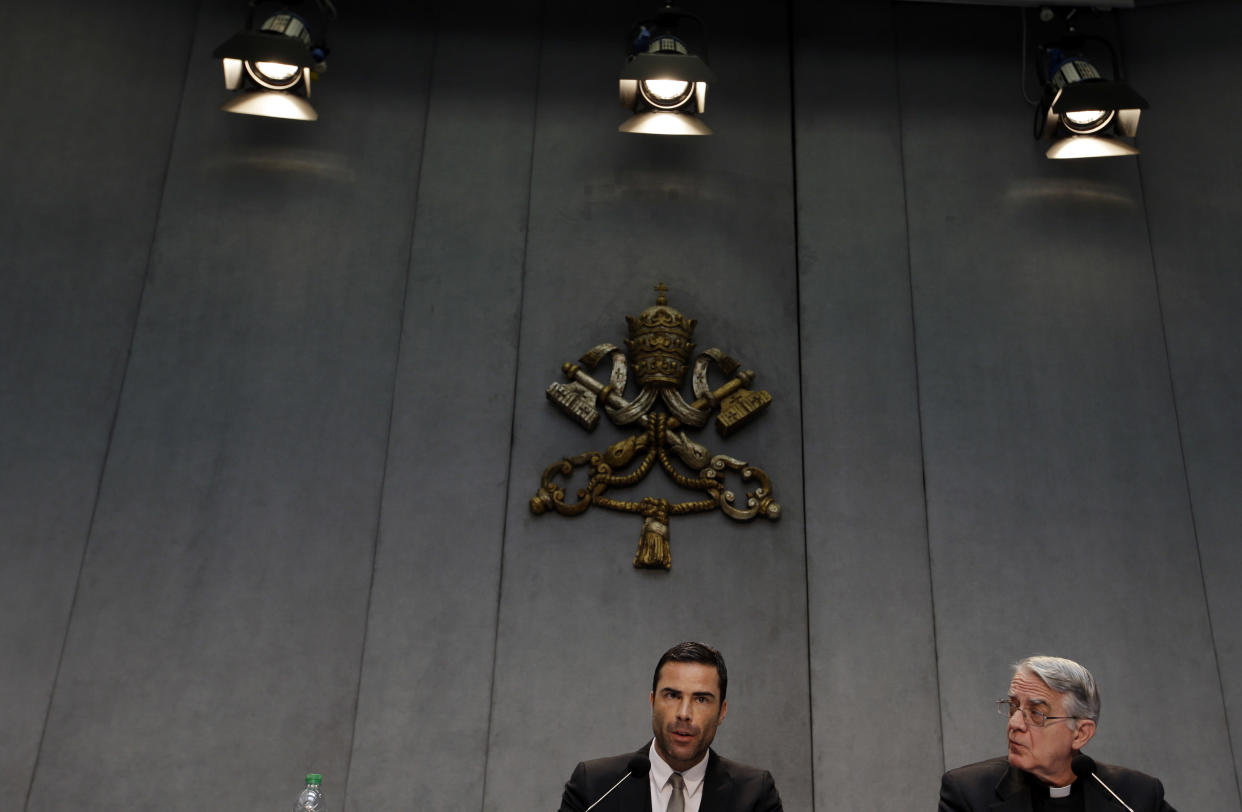Vatican releases 1st report of financial watchdog
Vatican releases 1st report of financial watchdog, but several transparency issues remain

Rene Brulhart, director of the Financial Information Authority, an institution established by Pope Benedict XVI in 2010 to monitor the monetary and commercial activities of Vatican agencies, and Vatican spokesman Federico Lombardi, meet the press at the Vatican, Wednesday, May 22, 2013. The Vatican took another step Wednesday in trying to show greater financial transparency by publishing a first annual report from its financial watchdog agency and announcing new regulations to fight money laundering and terror financing that are expected in the coming weeks and months. (AP Photo/Gregorio Borgia)
VATICAN CITY (AP) -- The Vatican took another step Wednesday to show greater financial transparency by publishing the first annual report from its financial watchdog agency and announcing new regulations to fight money laundering and terror financing.
The report from the Financial Intelligence Authority showed the agency received six internal reports on suspicious transactions in 2012, up from one a year earlier, and that two were sent onto Vatican prosecutors for investigation.
But the 10-page report made scant mention of any supervisory operations carried out in 2012. International financial authorities have recommended the agency conduct inspections and issue internal regulations to fight money laundering and terror financing.
The report also made no mention of the troubles that led to the suspension of credit card services inside the Vatican for several months, an embarrassment that inconvenienced the thousands of people who visit the Vatican and its museums each day.
The Vatican created the oversight agency in 2010 in a bid to shed its image as a secretive tax haven and improve its reputation in global financial circles following a series of scandals at its bank and a money laundering investigation launched by Rome prosecutors in 2010.
As part of that effort, the Holy See submitted itself to the Council of Europe's Moneyval evaluation process, which assesses countries' compliance with international anti-money laundering and anti-terror financing norms.
The Vatican in July passed the test on the first try and Moneyval said it had made great progress in a short amount of time. But the Holy See received poor or failing grades for the watchdog agency and its bank.
Specifically, Moneyval said the role, authority and independence of the watchdog agency was unclear and that the Vatican bank's rules for customer due diligence, wire transfers and suspicious transaction reporting were insufficient. It said the bank needed an independent supervisor and must conduct a thorough risk assessment to ensure that it knew its clients and the risks it faces.
The report issued Wednesday addressed few of those recommendations.
"I'm not here today to say that everything is great and perfect," said Rene Bruelhart, the agency director.
But at a press briefing, he stressed that a lot had been accomplished and that the Vatican was committed to pursuing the Moneyval process. He said that within the coming weeks and months, the Vatican would update its laws to more closely respond to the Moneyval recommendations and he said that screening of the bank account-holders was currently under way.
"We are more than on the right track in having an increased amount of suspicious transactions reports, that's also a clear sign that this type of screening is taken very seriously," he said.
The Vatican must submit a progress report to Moneyval in September, Bruelhart said.
In addition to the report, the Vatican has recently announced other measures aimed at greater financial transparency, including publication of the annual report of its bank and enlisting an international agency to certify the bank's compliance with anti-money laundering and anti-terror finance norms.
The watchdog agency has two main functions: one, as a financial intelligence unit that gathers and analyzes financial information, and the other supervising and regulating the Holy See's government, including the bank.
While the report released Wednesday provided 2012 statistics and updates on the financial intelligence work of the agency, there was slim information about the supervisory and regulatory work conducted in 2012.
There were no reports, for example, of any on-site inspections being carried out or any sanctions being meted out for infractions. The report was also silent on Moneyval's recommendation that the financial authority review the NGOs that work inside the Vatican for compliance with anti-money laundering and anti-terror finance norms.
And it made no mention of the decision by Italy's central bank to compel Deutsche Bank Italia to stop providing electronic payment services to the Holy See on Dec. 31. That meant that for several months in 2013, until a new service provider was found, visitors to the Vatican Museums — they numbered 5 million last year — and the Vatican post office had to pay cash for tickets and any other transactions.
While the cash-only problem didn't begin until Jan. 1, after the 2012 reporting period, presumably the problems that led to it were known last year.
In its decision, the central bank had cited the fact that the Vatican had insufficient banking supervision. Bruelhart, however, said Wednesday the dispute was between the Bank of Italy and Deutsche Bank, not the Vatican.
He added that as a result of the dispute, however, relations had improved between the Bank of Italy and Vatican and that an agreement formalizing such relations might soon be reached.
___
Follow Nicole Winfield at www.twitter.com/nwinfield

